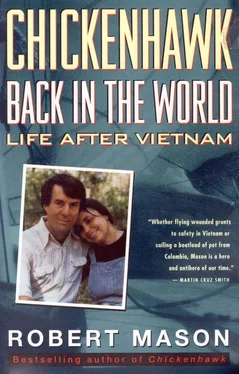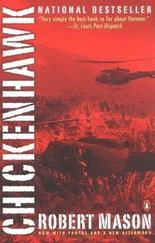Robert Mason - Chickenhawk - Back in the World - Life After Vietnam
Здесь есть возможность читать онлайн «Robert Mason - Chickenhawk - Back in the World - Life After Vietnam» весь текст электронной книги совершенно бесплатно (целиком полную версию без сокращений). В некоторых случаях можно слушать аудио, скачать через торрент в формате fb2 и присутствует краткое содержание. Год выпуска: 2013, Издательство: BookBaby, Жанр: Старинная литература, на английском языке. Описание произведения, (предисловие) а так же отзывы посетителей доступны на портале библиотеки ЛибКат.
- Название:Chickenhawk: Back in the World - Life After Vietnam
- Автор:
- Издательство:BookBaby
- Жанр:
- Год:2013
- ISBN:нет данных
- Рейтинг книги:3 / 5. Голосов: 1
-
Избранное:Добавить в избранное
- Отзывы:
-
Ваша оценка:
- 60
- 1
- 2
- 3
- 4
- 5
Chickenhawk: Back in the World - Life After Vietnam: краткое содержание, описание и аннотация
Предлагаем к чтению аннотацию, описание, краткое содержание или предисловие (зависит от того, что написал сам автор книги «Chickenhawk: Back in the World - Life After Vietnam»). Если вы не нашли необходимую информацию о книге — напишите в комментариях, мы постараемся отыскать её.
Chickenhawk: Back in the World - Life After Vietnam — читать онлайн бесплатно полную книгу (весь текст) целиком
Ниже представлен текст книги, разбитый по страницам. Система сохранения места последней прочитанной страницы, позволяет с удобством читать онлайн бесплатно книгу «Chickenhawk: Back in the World - Life After Vietnam», без необходимости каждый раз заново искать на чём Вы остановились. Поставьте закладку, и сможете в любой момент перейти на страницу, на которой закончили чтение.
Интервал:
Закладка:
The idea of going to my parents is just intolerable. They’ve already muttered a couple of I-told-you-so’s recently about trying to be a writer when I could have gone into real estate. I borrowed a thousand from Smith when we first got to Florida and still haven’t paid it back. Knox? Well, Knox is my agent, not a small loan company.
I’m standing on my mortgagor’s riverbank wondering what the fuck I’m going to do when the rest of the bad luck troupe arrives.
“Mason, I hear your goddamn car broke down,” says John Tiller- man, who’s walked up behind me.
I nod at the river. “You heard right, John.”
“Well, I came over to offer you a job.”
Job? John has told me he ferries sailboats around for rich people—you know, from their summer homes in Cape Cod to their winter homes in Saint Thomas and stuff—what kind of job can he have for me?
“A sailor job,” John says. “Pays good. How does thirty thousand for two weeks work sound to you?”
It takes my breath away, is how it sounds. Thirty thousand? I could live for three whole, restful years on thirty thousand dollars. I’d have all the time I need to finish my book. It’d change my life; that’s how it sounds. But then, I ask what kind of work a sailor can do for two weeks that’s worth thirty thousand to anyone.
I already know the answer to that. I just want confirmation. I’ve been approached by people a few times in the past about flying a plane load or a helicopter load of marijuana into the country. One trip, lotsa money was the common thread of these deals. I’ve always turned the offers down; never even knew if they were serious offers; didn’t want to know. I wasn’t against marijuana; I just knew I wasn’t cut out to wear stripes and get butt-fucked.
Times change. It feels like an inevitable thing is happening here—like a cosmic gift after so much bad luck. I’ve just gotten the sixth rejection letter for my book—writing is obviously not making me money. Two weeks on a dangerous mission could save my ass. And hey, I’ve had professional experience doing dangerous missions—it’s what I was trained to do. It is right down my alley.
I decide to be a pot smuggler.
Feeling a shot of adrenaline jolt me, I say okay.
John and I walk up to the cabin. Patience is just back from her paper route. I tell her I am sailing to Colombia.
Patience says, “I think that’s the dumbest thing I’ve ever heard of.” I say, yeah, uh-huh, but “John says I’ll make thirty thousand for two weeks’ work.”
Patience’s eyebrows rise and she cocks her head and wrinkles her brow and finally she says, “Oh.” And nods.
PART TWO
THE
SCAM
CHAPTER 12
November 1980—John Tillerman had been a helicopter door gunner in Vietnam in 1969, had chosen to move to the same woods I had, was also building his own house. We had similar backgrounds and interests when he offered me the smuggling job.
As people, we were quite different. Tillerman was big: six feet tall, 175 pounds; a sturdy man, strong, filled with energy bordering on frenzy. I was medium-sized, medium strength, and lazy. Tillerman set a dizzy pace, racing around making sure everybody was happy, which put some people on edge. He went to the University of Virginia after the war and graduated in 1974 with a major in psychology.
Patience had seen John walking down our road, found out he was a new neighbor, and brought him over to see our place. We told him we were trying to be writers, which seemed to impress him. He said he sailed yachts for a living.
As I got to know John—I’d wander up the quarter-mile sandy path between our properties and watch him and his uncle building his house—I learned that he’d taught himself to sail by building his own small boat and sailing it single-handedly to England and Portugal and back. He seemed to have plenty of money, which, he explained, was the consequence of his ferrying-yachts-for-rich-folks business. He was generous, the kind of person, I think, who’d be generous even if he was actually rich, rather than just flush. He insisted on lending me the money to buy an electric typewriter to replace the manual portable I’d been using, without setting a pay-back date. When we had car breakdowns on the paper route, he’d immediately offer his car or truck.
Tillerman was gone for weeks at a time. When he returned, he’d come down and tell Patience and me about his adventures at sea, describing the kinds of people he had to deal with—always portrayed in his stories as rich, selfish, dumb as stumps—and the perils of sailing. He described hair-raising storms that lasted days. He claimed pirates were boarding yachts in the Caribbean and killing everybody on board just to get boats to sell to drug smugglers. I liked the stories because I liked adventure and I’d always wanted to sail, but John’s drinking habit—something I understood very well—often made his tales repetitious and tiresome. I wondered if I was like John when I drank.
But John was a godsend for us, and he set about teaching me the business. The business was smuggling marijuana and only marijuana. He and his friends had considered bringing in cocaine—it’s much more compact and profitable—but they decided they couldn’t handle the karma (these were sixties veterans, grown-up flower children, graduates of the Carlos Castenada School of the Universe). Marijuana, in their opinion, was harmless. John smuggled pot, but he seldom smoked it, preferring alcohol.
We drove to a marina in Jacksonville to see the Namaste , a thirty-six-foot custom-built sailboat based on a Westsail hull. She was a fiberglass double-ender based on a Norwegian lifeboat hull design. The Namaste had just been put into the water after being trucked from California.
“See how the cabin is almost flush with the deck?” John said.
“Yeah. That’s good?”
“You bet, Bob. Very good. When the waves start coming over this lady, they don’t have anything to bash against.”
“Good design.”
“Yep. They use boats like this in the North Sea, Bob. They know about storms up there.” He pointed to a Hunter sailboat which looked posh with lots of varnish and brass and teak. “Piece of junk, Bob. Total waste of money. That boat was designed to sit right there, tied up. It’s a party boat for people who don’t know how to sail.”
We hunkered down on the dock and John pointed to the Namaste’s painted waterline. “See how it’s about half a foot out of the water?” John smiled. “They did that in California before they shipped it.” He looked around. The closest person was a guy sitting on a deck chair in the Hunter, a hundred feet away. “That’s so when we load up with a couple tons of product, the water line looks just right, like we got nothing on board, eh? Empty fucking boat.”
I nodded. These guys think of everything.
The Namaste didn’t look seaworthy, however. Its mast and rigging had been removed for the truck ride to Florida. Coiled cable, crumpled tarps, paintbrushes, paint cans, and tools lay scattered on the deck. “It’s a mess, Bob. But in a couple weeks you won’t recognize her. We got lots to do. We have to step the mast and set up the rigging just to get it sailing, and that’s only the beginning. We need to put on the vane gear—”
“Vane gear?”
“Yeah. It’s this tricky gizmo from England that steers the boat automatically. Works like a charm. You’re going to love it. You like mechanical stuff, I know. No one gets stuck holding the tiller with that thing on the job.” He smiled. “Vane gear, new radios, antennas for the fucking radios, depth finder, bonding strip—”
“Bonding strip?”
“It connects everything to the ground side of the electrical system. We’ll put a copper strip all around the inside of the hull and make sure all the metal stuff and all the electrical stuff is hooked up to it. It’s good in lightning, and it’s good for the electrical stuff. That’s going to be your job, Bob.”
Читать дальшеИнтервал:
Закладка:
Похожие книги на «Chickenhawk: Back in the World - Life After Vietnam»
Представляем Вашему вниманию похожие книги на «Chickenhawk: Back in the World - Life After Vietnam» списком для выбора. Мы отобрали схожую по названию и смыслу литературу в надежде предоставить читателям больше вариантов отыскать новые, интересные, ещё непрочитанные произведения.
Обсуждение, отзывы о книге «Chickenhawk: Back in the World - Life After Vietnam» и просто собственные мнения читателей. Оставьте ваши комментарии, напишите, что Вы думаете о произведении, его смысле или главных героях. Укажите что конкретно понравилось, а что нет, и почему Вы так считаете.












